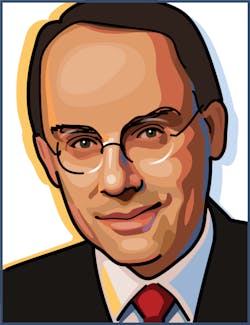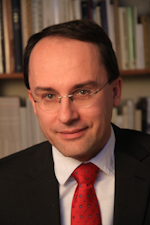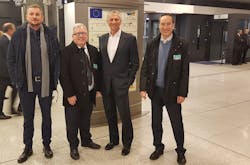
Just recently, the three Nobel Laureates Gérard Mourou, Stefan W. Hell, and Theodor W. Hänsch wrote an open letter to the European Commissioners Carlos Moedas and Mariya Gabriel. The two commissioners are members of the European Commission and are responsible for Research, Science, and Innovation (Moedas) and for the Digital Economy and Society (Gabriel).
We know the three laureates for their outstanding achievements in several fields of photonics, but so far not for their political engagement. What made them become politically active?
It is the complete absence of photonics in the new program for research and innovation funding in Europe—Horizon Europe. This program will define the rules of spending a budget of roughly 100 billion Euro over the period 2021 to 2017. Within the last such program, named Horizon 2020, photonics was defined as Key Enabling Technology (KET) and received considerable attention—and funding.Now: Lobbying
The letter from the three Nobel laureates was just one highlight in a longer lobbying campaign by major European photonics associations. Most activities were driven by Photonics21, a European technology platform that unites more than 2500 stakeholders from photonics industries and R&D organizations, and EPIC, the European Photonics Industry Consortium.
"We talked to all stakeholders and contacted numerous officials in Brussels," said Carlos Lee, the Director General of EPIC. The effort led to considerable success: EPIC got 532 CEOs from the European photonics industry to sign a position paper demanding advancement of the legislation draft. This position paper was supported by 44 regional photonics associations from 23 countries, including OSA, SPIE, and EOS, the European Optical Society."Lobbying takes time," noted Carlos Lee. "We hope to get to substantial changes before the new Parliament becomes active in summer 2019." At least the attention of the community is high: When he posted the issue on LinkedIn, he collected 15,000 impressions within one week.
What is demanded?
Understanding legislative texts requires time and patience. Given the importance of the outcome, it is worth spending both to understand even minute details. The basic document of "Regulation of the European Parliament and of the Council establishing Horizon Europe—the Framework Programme for Research and Innovation, laying down its rules for participation and dissemination" in its simplest form is a 54 page document.
The program is complex and introduces several new ideas and institutions. One slideshow on Horizon Europe gives a first overview of the motivation and organizational details. Under the headline "evolution not revolution," the program is divided in three pillars: (1) Open Science, (2) Global Challenges and Industrial Competitiveness, and (3) Open Innovation. The second pillar covers five clusters, each with a multibillion Euro budget, reaching from Health to Digital and Industry. Now, interdisciplinary cooperation is desired, and therefore nine "areas of intervention" are defined across these clusters. And those areas will be fields of intense funding.
Accordingly, the campaign from the European photonics community, and namely the EPIC position paper, suggests three major changes (shortened here):
1) Increase the budget proposed for the second pillar on Global Challenges and Industrial Competitiveness
2) Prioritize and enhance the role of key technologies for EU competitiveness and explicitly add photonics as an area of intervention to the nine intervention areas listed in the Digital and Industry cluster
3) Prioritize KET and public-private partnerships for KET, particularly for photonics
The full 15 page position paper was presented to the European Commission in Brussels in December 2018. The new European Parliament will be elected in May 26, 2019. Changes in the legislative draft are expected not before summer 2019.
In a final conversation, Carlos Lee confirmed to me that he sees a lot of indirect support for photonics through the areas named in the draft already. His concern is more about disbanding the photonics community by not making photonics a visible priority.
The press release from the European Commission, which announces Horizon Europe as the "most ambitious Research and Innovation programme so far," states that every Euro spent for the program could "generate a return of up to 11 Euro of GDP." So let photonics be part of it.

Andreas Thoss | Contributing Editor, Germany
Andreas Thoss is the Managing Director of THOSS Media (Berlin) and has many years of experience in photonics-related research, publishing, marketing, and public relations. He worked with John Wiley & Sons until 2010, when he founded THOSS Media. In 2012, he founded the scientific journal Advanced Optical Technologies. His university research focused on ultrashort and ultra-intense laser pulses, and he holds several patents.

